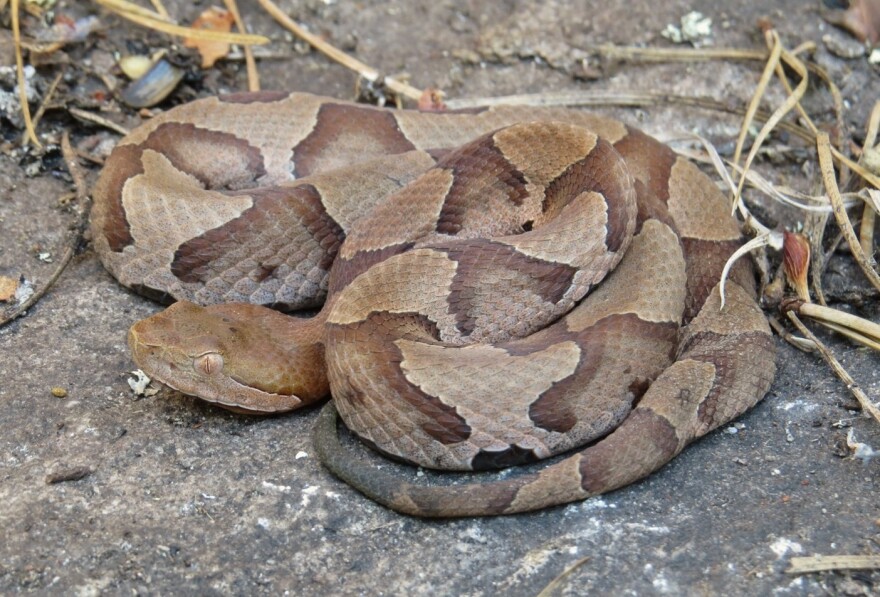With warmer weather and more outdoor activities comes the increase in snake sightings in North Carolina. There are nearly 40 species of snakes in the state with one of the most common being the copperhead. Despite the fact that there are copperheads in every county in North Carolina, there are still a lot of misconceptions and myths about them says herpetologist Jeff Beane.
Beane says copperheads aren’t aggressive snakes, they aren’t out to bite humans and if a homeowner kills or relocates a copperhead from the backyard, another snake will take its place.
Guest host Anita Rao talks to Beane about these myths and why they persist. He also talks about what researchers are doing to learn more about snakes. Beane is the collections manager for herpetology at the North Carolina Museum of Natural Sciences.
Interview Highlights:
Jeff Beane on why you shouldn’t say “poisonous snakes”:
Venoms are poisons in the broadest sense of the term, but a lot of herpetologists have a real pet peeve when someone says a snake is poisonous. Normally venom has to be injected, introduced into the body to cause harm, whereas a poison has to be ingested. So if it bites you and you get sick, its venomous, if you bite it and you get sick its poisonous.
What will likely happen if you encounter a snake:
Usually most snakes, if you encounter them and they're coiled up somewhere where they want to be, they'll remain completely still and hope that you don't see them or bother them, if they even know you're there at all. If you do disturb them, the first thing they'll probably do is try to get away. If they don't have an outlet to get away, or you get right up in their face or try to pick them up and step on them, they might bite to defend themselves, depending on the species and the individual. Some snakes don't bite no matter what you do to them. And some individuals within a species have more of a tendency to bite than others. Just like people, they'll have a shorter fuse than others.

Why you shouldn’t remove a snake from your backyard:
They're part of the world, they have home ranges, and most snakes know exactly where they are. If you move them they're going to be lost just like if you moved you or me out to California or somewhere, the first thing we'd do is try to get back home. Snakes are going to try to do that too. They're going to try to get back to something that's familiar … If you feel like you have to move a snake, usually a short distance translocation, something less than 200 meters, is probably what's recommended so that it's away from your front doorstep but it still knows where it is.
The biggest myth about snakes:
That snakes are aggressive, that they're out to get people, that if you see if a snake it's going to attack you or bite you and that all of them are dangerous. Snakes really are not dangerous at all if you just leave them alone. Nobody's ever been bitten by snake while they were leaving it alone. It's always when they step on it or pick it up or try to kill it or mess with it.
What snakes do that is good for humans:
It does happen that snakes do certain things for humans. They eat a lot of species that we don't like, like mice and rats, that can cause diseases and problems. And [by] eating a lot of rodents, snakes are swallowing a lot of ticks. And ticks cause things like Rocky Mountain spotted fever and Lyme disease. One study showed that snakes are significant tick destroyers in Eastern forest sites. Their venoms are also being used for a lot of different kinds of research. Research on various cancers and neurological diseases like Alzheimer's and Parkinson's. Venoms may be someday successfully used to treat those kinds of human ailments. Venom research is really just in its infancy so we don't know what medical miracles may lie hidden in some of the venoms of these species.




